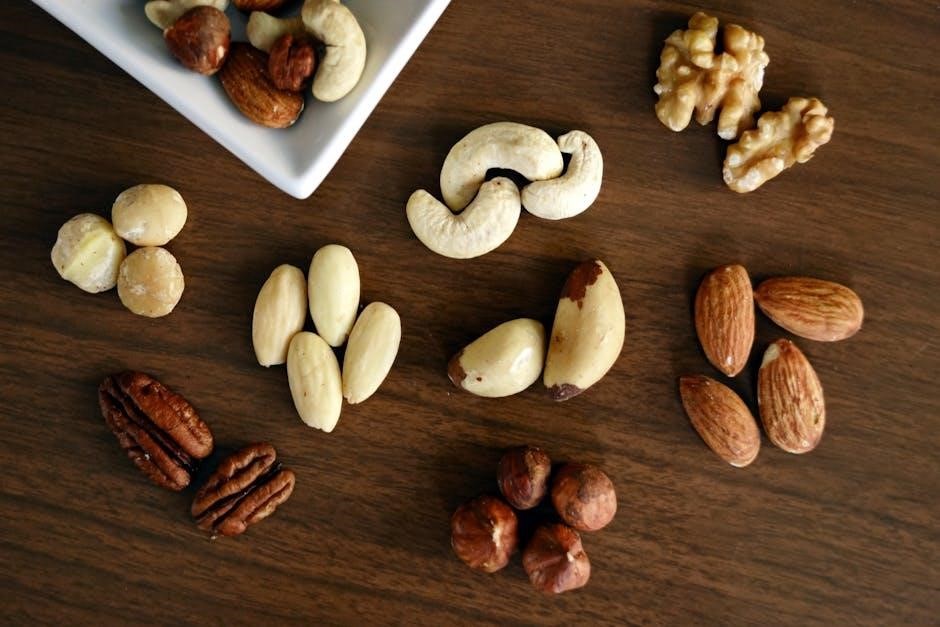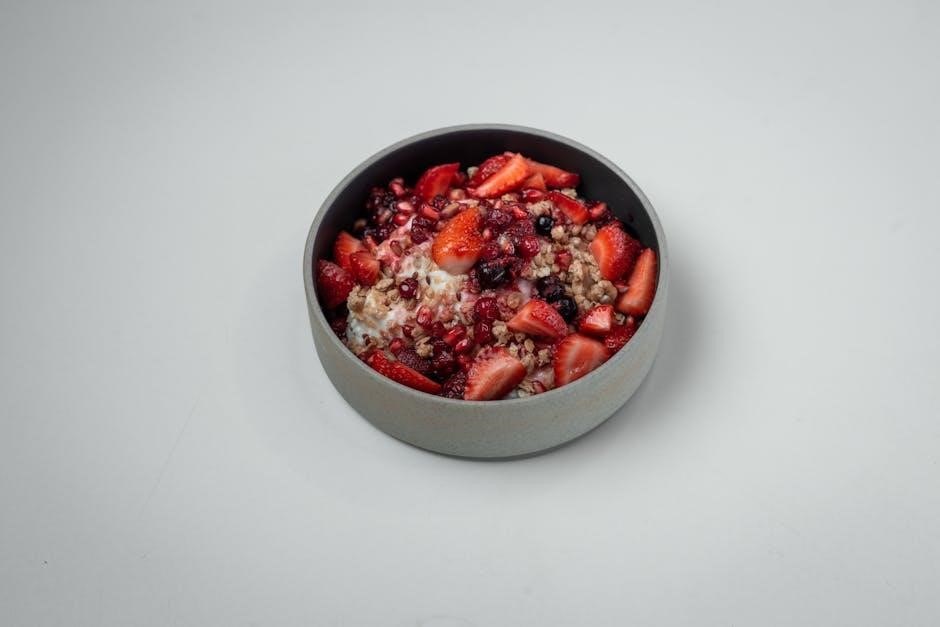The Primal Diet is a lifestyle-based eating plan centered around whole, unprocessed foods inspired by ancestral dietary patterns. It emphasizes nutrient-dense ingredients and excludes modern processed foods, promoting overall well-being and health.
Overview of the Primal Diet
The Primal Diet, developed by Mark Sisson, is a lifestyle-based eating plan that mimics the dietary habits of early humans. It focuses on consuming whole, nutrient-dense foods such as meats, fish, fruits, vegetables, nuts, and seeds while avoiding modern processed foods, grains, and legumes. The diet emphasizes raw, minimally processed ingredients to promote health and well-being. By eliminating harmful additives and focusing on responsibly sourced foods, the Primal Diet aims to restore the body’s natural balance. It also encourages regular exercise, adequate sleep, and exposure to sunlight, aligning with ancestral living practices. This approach is designed to improve energy levels, digestion, and overall health, making it a holistic choice for those seeking a sustainable way of eating.
Importance of a Primal Diet Food List
A Primal Diet Food List is essential for guiding individuals through the transition to a lifestyle centered on ancestral eating patterns. It provides clarity on which foods align with the diet’s principles, ensuring followers can make informed choices. By focusing on whole, nutrient-dense foods and avoiding modern processed items, the list helps maintain the diet’s core philosophy. It simplifies meal planning, reducing confusion and decision fatigue. The list also highlights the importance of responsibly sourced ingredients, promoting sustainability and health. For those new to the Primal Diet, the food list serves as a roadmap, helping them avoid harmful additives and stay committed to their goals. Ultimately, it empowers individuals to embrace a holistic approach to nutrition, supporting overall well-being and longevity. The structured guidance of a Primal Diet Food List makes adopting and sustaining this lifestyle achievable and sustainable.

Core Principles of the Primal Diet

The Primal Diet focuses on whole, unprocessed foods inspired by ancestral eating patterns, emphasizing nutrient-dense ingredients and excluding modern processed items to promote overall well-being and health naturally.
Focus on Whole, Unprocessed Foods
The Primal Diet emphasizes consuming whole, unprocessed foods that align with ancestral eating patterns. This approach prioritizes nutrient-dense ingredients like meats, fish, eggs, and organic fruits and vegetables. By avoiding modern processed items, the diet aims to mimic the natural diet of early humans, promoting better digestion and overall health. Whole foods provide essential vitamins, minerals, and antioxidants while supporting sustainable energy levels. The diet also encourages responsibly sourced proteins and organic produce, ensuring high-quality nutrition. This focus on unprocessed foods helps eliminate harmful additives and preservatives found in modern diets. By adhering to this principle, individuals can reboot their metabolism and foster a healthier relationship with food. The Primal Diet is not just about eating; it’s a lifestyle that embraces natural, wholesome nutrition to achieve long-term well-being.
Avoiding Modern, Processed Foods
Avoiding modern, processed foods is a cornerstone of the Primal Diet, which seeks to eliminate harmful additives, preservatives, and artificial ingredients. By excluding grains, legumes, and sugary foods, the diet minimizes inflammation and promotes better metabolic health. Processed foods, often high in unhealthy fats and empty calories, are replaced with nutrient-dense options. This approach encourages a return to natural eating patterns, focusing on whole foods that early humans would have consumed. The diet also advises against consuming artificial sweeteners, refined sugars, and industrial oils, which are prevalent in modern processed foods. By eliminating these, individuals can reduce their exposure to toxins and improve digestion. The Primal Diet emphasizes that avoiding processed foods is not just about weight loss but about fostering long-term health and vitality. This philosophy aligns with the idea of eating as naturally as possible, free from the pitfalls of modern industrial food production.
Allowed Foods on the Primal Diet
The Primal Diet emphasizes whole, nutrient-dense foods like meats, fish, eggs, vegetables, fruits, nuts, seeds, and healthy fats. It also includes dairy and vegan options, promoting flexibility and variety.
Meats and Poultry

Meats and poultry are cornerstone components of the Primal Diet, emphasizing high-quality, nutrient-dense sources. Grass-fed beef, pasture-raised chicken, and wild game are highly recommended for their rich protein and nutrient profiles. Organ meats, such as liver, are also encouraged due to their high vitamin and mineral content. The diet prioritizes organic and responsibly sourced options to avoid harmful additives. Avoiding processed meats like sausages and deli products is crucial, as they often contain artificial preservatives. Poultry should be free from antibiotics and hormones to align with the diet’s ancestral principles. These foods provide essential amino acids, vitamins, and minerals, supporting overall health and energy levels. By focusing on whole, unprocessed meats and poultry, followers of the Primal Diet can maintain a balanced and nourishing eating plan.
Fish and Seafood
Fish and seafood are integral to the Primal Diet, offering essential nutrients like omega-3 fatty acids, vitamins, and minerals. Wild-caught options such as salmon, mackerel, and sardines are highly recommended for their high nutrient density and lower mercury content. Shellfish like shrimp, mussels, and oysters are also encouraged due to their rich mineral profiles. The diet emphasizes avoiding farmed fish, as they may contain lower nutrient levels and potential contaminants. Freshness and sustainability are key when selecting seafood to ensure optimal health benefits. Fish and seafood provide lean protein and are versatile in meal preparation, making them a staple in the Primal Diet. By incorporating these foods, followers can enhance their diet with vital nutrients while aligning with ancestral eating patterns. This focus on wild and responsibly sourced seafood supports overall well-being and aligns with the diet’s core principles of natural, unprocessed foods.

Fruits and Vegetables
Fruits and vegetables play a vital role in the Primal Diet, providing essential vitamins, minerals, and antioxidants. Emphasis is placed on consuming a wide variety of colorful, whole options to maximize nutrient intake. Berries, such as strawberries, blueberries, and raspberries, are highly recommended due to their high antioxidant content and low sugar levels. Leafy greens like spinach, kale, and lettuce are also encouraged for their nutrient density. Cruciferous vegetables, including broccoli, cauliflower, and Brussels sprouts, are valued for their health-promoting properties. The diet advises avoiding high-sugar fruits like bananas and tropical varieties, as well as starchy vegetables such as potatoes. Fresh, seasonal, and organic produce is preferred to ensure optimal nutritional benefits and minimize exposure to pesticides. By focusing on these whole foods, followers of the Primal Diet can maintain a balanced intake of fiber, vitamins, and minerals, supporting overall health and well-being.

Nuts, Seeds, and Healthy Fats
Nuts, seeds, and healthy fats are integral to the Primal Diet, offering essential fatty acids, protein, and fiber. Almonds, walnuts, and macadamia nuts are popular choices, providing omega-3 fatty acids and antioxidants. Seeds like chia, flax, and pumpkin are rich in omega-3s and fiber. Healthy fats such as avocados, olive oil, and coconut oil are encouraged for their anti-inflammatory properties and energy-sustaining benefits. The diet emphasizes choosing unsalted, unsweetened, and unroasted options to avoid added sugars and preservatives. Nuts and seeds should be consumed in moderation due to their calorie density. Healthy fats are also highlighted for their role in supporting heart health and satiety. By incorporating these foods, followers of the Primal Diet can maintain a balanced intake of fats and nutrients, promoting overall well-being and energy levels throughout the day.
Dairy and Vegan Options
Dairy and vegan options play a unique role in the Primal Diet, catering to diverse dietary preferences. High-quality, minimally processed dairy products, such as grass-fed cheeses and full-fat yogurts, are permissible for those who tolerate lactose. These options are valued for their nutrient density and probiotic benefits. On the vegan front, plant-based choices like organic vegetables, fruits, nuts, and seeds are emphasized. However, traditional vegan staples such as legumes are excluded due to their phytotoxin content. The diet encourages selecting whole, organic foods to maintain alignment with its principles. While the Primal Diet is typically animal-based, thoughtful vegan adaptations can be made by focusing on nutrient-rich, unprocessed plant sources. This approach ensures that both dairy and vegan options contribute to a balanced and satisfying Primal Diet regimen.
Foods to Avoid on the Primal Diet
The Primal Diet eliminates grains, legumes, sugary foods, and processed items, focusing on whole, unprocessed foods to align with ancestral eating patterns and promote optimal health and well-being.
Grains, Legumes, and Sugary Foods

Grains, legumes, and sugary foods are strictly avoided on the Primal Diet due to their high content of anti-nutrients like phytates and lectins, which can interfere with nutrient absorption and cause inflammation. Grains such as wheat, barley, and rice are excluded because they contain gluten and other compounds that may disrupt gut health. Legumes, including beans and lentils, are also omitted for similar reasons. Sugary foods, whether natural or processed, are discouraged as they can lead to blood sugar spikes and contribute to chronic health issues. This elimination aligns with the diet’s focus on ancestral eating patterns, which centered on whole, unprocessed foods. By avoiding these groups, the Primal Diet aims to promote better digestion, reduce inflammation, and support overall health and well-being.
Processed Foods and Artificial Additives
Processed foods and artificial additives are strictly avoided on the Primal Diet due to their detrimental effects on health. These foods often contain harmful preservatives, artificial flavors, and coloring agents that can disrupt natural bodily functions. Refined sugars, trans fats, and sodium are also prevalent in processed foods, contributing to chronic diseases like obesity, diabetes, and heart conditions. Artificial additives, such as MSG and aspartame, are linked to inflammation and digestive issues. The Primal Diet emphasizes whole, unprocessed foods to ensure optimal nutrition and avoid the negative impacts of modern food manufacturing. By eliminating these substances, the diet promotes a cleaner, more natural way of eating that aligns with ancestral nutritional practices.




About the author